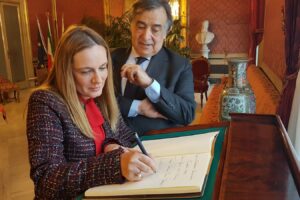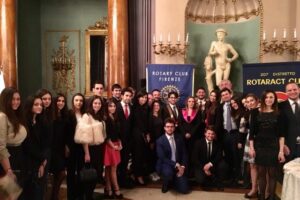On March 27, the MOAS XChange forum took place in Valletta. This second edition was an unprecedented opportunity to explore safe and legal alternatives to the maritime migration route in the Mediterranean Sea.
From its inception as a civil society response to people dying at sea, MOAS has rescued over 33,000 people, but we are aware it is time to move on and find new and reliable solutions to the current humanitarian catastrophe.
Our panelists were all high-level professionals in the field of migration: Oliviero Forti (Caritas Italiana), Cesare Giacomo Zucconi (Sant’Egidio Community), Kahin Ismail (UNHCR Representative in Malta), Alganesc Fessaha (Associazione Ghandi) and Dr Jeff Crisp (Refugee Studies Centre).
Marina Lalovic, a journalist based in Rome, moderated the discussion and introduced herself highlighting her own past experience of fleeing Serbia during the Milosevic’s regime.
Soon after, Charles Scicluna, Archbishop of Malta, took the floor to bless the audience and the 2017 MOAS mission. He also blessed the flag of St Peter & Paul which has now been returned from Cologne, where we left it last January as a symbol of friendship between Germany and the Mediterranean Sea. The Archbishop invited everyone to answer the question: why should people die at sea? They shouldn’t. All life began at sea, so hopefully a new season of mercy, hope and compassion is going to start, together with MOAS’ mission to save lives.
As March 25th was the anniversary of the signature of the Treaty of Rome which founded the European Community, the focus was also on EU migration policies, which haven’t provided any efficient solution to the migratory phenomenon. The Dutch Ambassador in Malta, Joop Nijssen, stressed the urgent need for long-term EU policies in order to fight against growing populism, concerns and fears spread all over Europe. Despite the current migratory challenges, it is fundamental to safeguard basic human rights and support vulnerable people. He also acknowledged the primary role of MOAS’ team in mitigating the loss of lives at sea while calling for comprehensive EU solutions in cooperation with all Member States. Soon after, the Italian Ambassador in Malta, Giovanni Umberto De Vito, expressed his support for our upcoming MOAS mission and stressed the leading role Italy has played in the current humanitarian crisis by rescuing and welcoming migrants and refugees. Despite all efforts made so far, it is urgent to implement a common strategy to share responsibilities among EU Member States and restore solidarity.
We were honoured by the presence of H.E. Marie-Louise Coleiro Preca, President of Malta, who gave a speech stressing how migration is about children, women and men looking for a safe place to live. Being forced to use illegal ways, people end up in trafficking networks and put their lives in smugglers’ hands. Special attention was also devoted to women and girls, who are “targets of sexual violence and contemporary forms of slavery” and “make up almost half of all refugee and displaced populations”.
“Not one single human being should fear discrimination, or feel impaired to the enjoyment of our universal fundamental freedoms and rights”
H.E. Marie-Louise Coleiro Preca, President of Malta
There was a general agreement among the panelists that humanitarian corridors have to be implemented as soon as possible to disrupt smugglers’ business and provide people with safe alternatives to a deadly journey.
Cesare Giacomo Zucconi, from Sant’Egidio, explained his experience of establishing humanitarian corridors, while reminding the audience that “Refugees are not a danger. They are IN danger”. Moreover, he shared with us a 7-point strategy they wish to implement. It will be based on cooperation between civil society and institutions, with civil society taking the lead; quick screening procedures before people are moved to the welcoming countries; integration schemes including schooling and employment opportunities; capacity to target the most vulnerable individuals as well as to react rapidly in case of medical emergencies; and self-funded initiatives with no state aids. A similar approach was described by Oliviero Forti, Caritas Italiana, who also called for a political solution to eradicate the push-factors of migration and highlighted the positive reaction civil society has demonstrates so far in welcoming migrants and asylum-seekers. A special remark concerned the successful Canadian model of private sponsorship.
Full support to humanitarian corridors was also given by the UNHCR representative in Malta, Kahin Ismail.
Alganesc Fessaha, Associazione Gandhi, spoke about her personal experience in countries like Sudan or Egypt and defined humanitarian corridors as a way to avoid torture and death crossing the sea or the desert. When asked about their future, she replied that “the future of humanitarian corridors is bright”.
Before the first part of the forum ended, we watched a video message from Mario Giro, Italian Under-Secretary for Foreign Affairs, who expressed deep appreciation for MOAS’ activities and urged everyone to contribute to the current humanitarian crisis.
[vc_video link=’https://vimeo.com/210431146′]
The second part of our discussion was devoted to understanding how to replicate the available schemes for humanitarian corridors and Dr Jeff Crisp, Refugee Studies Centre, encouraged the use of the lessons learned from past events, such as the Vietnam crisis. Nevertheless, he warned that for a specific model to be successfully replicated, we must take into account a menu of factors about the host country.
Before concluding our forum, Dr Simon Busuttil, leader of the Opposition, took the floor and focused on the positive role civil society can have, as demonstrated by MOAS’ mission. Migration is a controversial topic and governments are crucial to finding the ultimate solutions. No country is big enough to face and handle this phenomenon alone, so the best course of action would be to empower civil society in forging feasible alternatives while cooperating with official authorities. Last but not least, EU Member States must work together to find a common solution.
From my side, I am convinced that humanitarian corridors at present are the best starting point to eradicate criminal networks and the traffickers exploiting the fears and hopes of our brothers and sisters fleeing unbearable violence just to reach a safe refuge.



